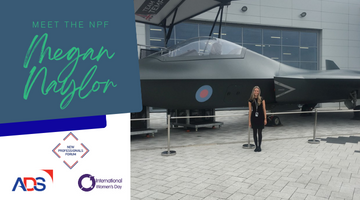
By Meg Naylor, NPF Chair
The most recent instalment in the New Professionals Forum’s ‘Development Series’ came from Caitlin Percy, an Operational Science Advisor with the Air, Space and Warfare Centre. Caitlin shared her exciting journey through various roles in innovation and collaboration, reflecting on career planning and her approach to ‘opportunity-based’ career planning.
Having completed a 2 year graduate scheme at BAE Systems, working in departments ranging from Data Analytics to Future Capabilities. After a secondment to Reaction Engines, Caitlin returned to BAE Systems and found her passion in a technology strategy role, working with technologists across the business to drive innovation. During this time she also became engaged in the ADS New Professionals Forum, driven by her passion to offer new professionals the opportunity to collaborate earlier on in their careers, rather than waiting for opportunities brought on by seniority.
It was fascinating to hear about the range of roles that Caitlin’s career has seen her in, with her current role as an Operational Science Advisor within the British Embassy in Emerging Technologies, focusing on how new technologies are developed and integrated. The future direction that she’s heading looks equally as exciting, as she moves into a role at the British Embassy in Washington DC later this year.
Caitlin reflected that her philosophy for career planning was ‘doing jobs you enjoy gives you the expertise for doing jobs you will enjoy in the future’. She spoke about the importance of owning your skills, and the trend towards not forcing employees down specific routes. Instead, Caitlin developed the idea of an ‘opportunity-based’ career plan: taking advantage of exciting and inspiring opportunities in a more natural way. This doesn’t mean having no direction, instead it means proactively networking, putting yourself out there and exploring (and creating!) opportunities as they arise.
Caitlin’s top tips around opportunity-based career planning included:
- ‘Help others help you’ – It is important to know what you are asking mentors for in terms of support. What are you good at, what skills do you want to develop and what do you want to be known for, rather than what structured steps make up your career plan.
- ‘Don’t leave it too long!’ – For most people, from when you decide that you want to change roles, it takes around 6 months to make the move. This means that it is a good idea to start exploring and considering your next steps early, rather than waiting
- ‘A Guide’ – Think about the characteristics of your future career in terms of roles and skills, and use this as your guide. From the perspective of roles, capturing the type of role you want to do, what you hope it will encompass and what you want to be known for through that role, is incredibly valuable. From the perspective of skills, think about how you want to develop outside of the scope of your role. What do you want to advocate for, do you want to achieve in terms of qualifications or experiences, what do you want your life to look like? Breaking these points out into 1 year, 5 years and 10+ years’ time is a really useful activity to guide conversations with mentors and gain granularity around your immediate next steps.
Finally, Caitlin shared her view on opportunities, and how to make them. Some key take-away points were:
- ‘Fill your opportunity back-pack’ – You don’t always know where opportunities are going to lead, so it’s important to engage with a range of opportunities in order to maximise future potential. Although it takes significant energy, it is vital to follow-up on every lead that comes your way so that you can leverage them in the future. Even if opportunities don’t come off, it’s great practice for when something comes along that you are really passionate about!
- If an opportunity isn’t coming to you, create it! – ‘Extra-curricular’ exposure is really important to build breadth across your skillset and experiences. Take a look at what your company already offers in terms of forums, Communities of Interest and programmes, and if there isn’t something that appeals to you, start your own!
- ‘Remember, nothing is forever’ – Unless you want it to be, it is rare that the next role you go into will last for the rest of your career. Focusing on the fact that you can change direction whenever you want to is a great way to embolden your career decision-making.
- ‘Find your soapbox’ – What are you really passionate about? If there is a topic that really engages you, how can you leverage this to find new opportunities. In Caitlin’s career, this is exemplified through her work with the Women in Defence UK organisation, which ultimately led to her discovering her next role.
Caitlin’s talk finished with the inspiring quote of ‘back others to learn about backing yourself’ – being a passionate supporter of those around you has the knock-on effect of changing the narrative in your own head. If you positively engage with and build up those in your network, that positive thinking will reflect back into your own mind-set and you will find your confidence increasing. Be bold, be proactive, and whether you actively plan or take a more opportunities-based approach, know that the person who has most control over your career direction is you!





